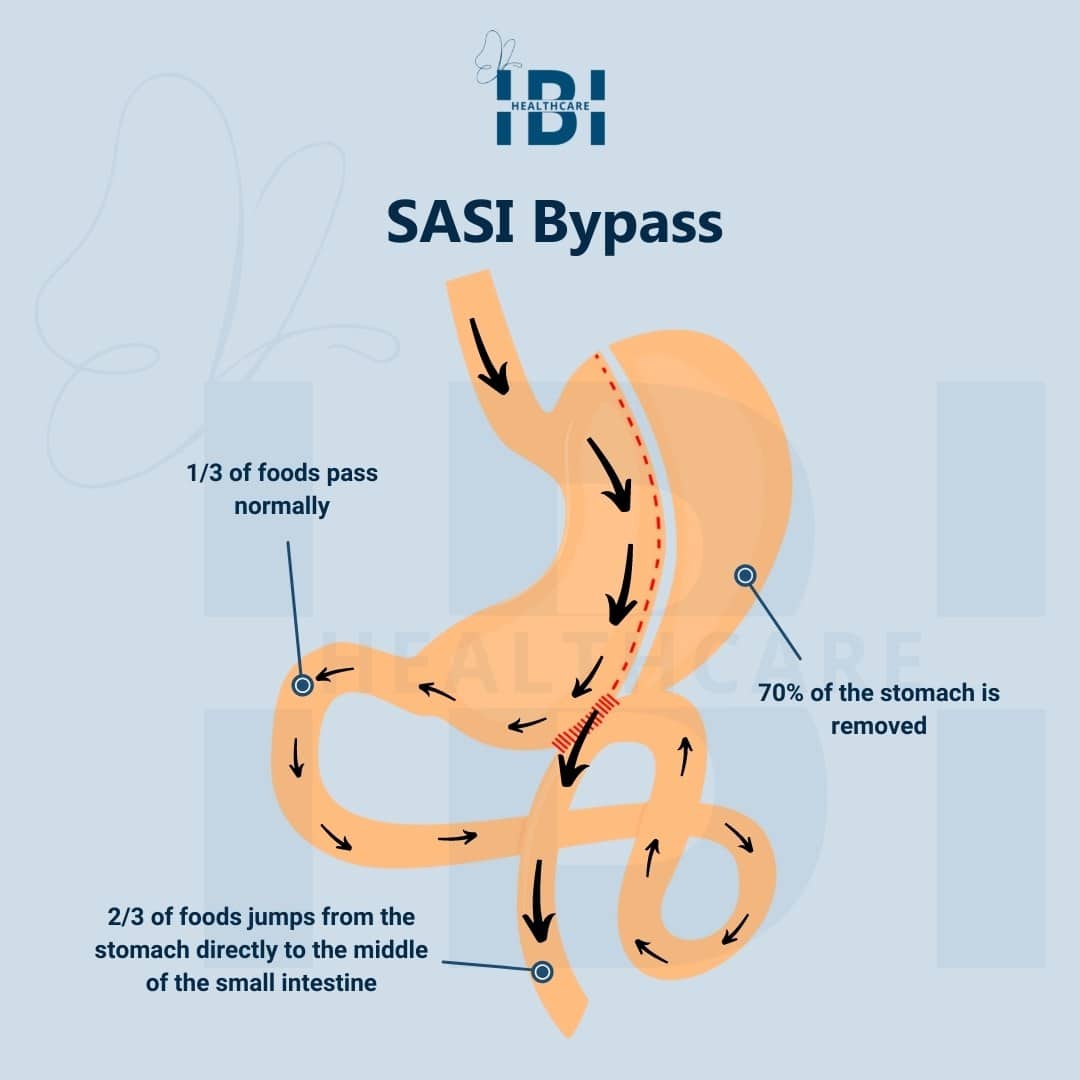Single Anastomosis Sleeve Ileal Bypass
Surgeons laparoscopically perform the Single Anastomosis Sleeve Ileal Bypass. Also known as SASI Bypass or simply SASI. Helps individuals with heavier weights to lose weight sustainably.
SASI allows patients to realize the benefits of both gastric sleeve and gastric bypass weight loss surgery. Without the risk of severe malabsorption. Describing it involves taking the best of both surgeries and combining them. Surgeons can perform SASI Bypass as a stand-alone procedure or can use it to modify an existing gastric sleeve surgery.

How Does SASI Bypass Work?
- During the surgery, surgeons reduce the stomach to about 75% of its original size.
- Nonetheless, surgeons perform the surgery using a laparoscope. Connecting the lower part of the stomach to the lower part of the small intestine.
- Moreover, surgeons skip the beginning and middle sections of the small intestine. This is all completed without needing to detach the stomach.
- Furthermore, the alteration to the stomach and the intestines after the SASI bypass. Allows the patient to eat only a small portion of food during one sitting.
- Also inhibits the amount of sugar and fat the body can absorb which results in significant weight loss.
Why Consider Anastomosis Sleeve Ileal Bypass?
SASI combines the benefits of gastric sleeve surgery and gastric bypass surgery with fewer associated risks:
- Patients can experience significant weight loss and reduction of weight-related health issues.
- The impact on type 2 diabetes and reduction of high cholesterol is greater than with gastric sleeve surgery.
- The risk of developing nutritional deficiencies is lower. Because the surgeon leaves the duodenum intact. It absorbs many of the nutrients into the body.
According to the 2019 study, 20 individuals with higher body weight and type 2 diabetes underwent SASI surgery. Though, 75% of the patients experienced complete remission of their type 2 diabetes within a year. By the end of the third month following the surgery, 95% achieved it after a year.
Who is a Candidate for the Procedure?
You may be a candidate for single anastomosis sleeve ileal bypass if:
- Firstly, your BMI is higher than 40+ or above 30 and you suffer from an associated weight-related disease. For instance, diabetes, sleep apnea, or high blood pressure.
- Secondly, you have made significant attempts to lose weight using diet, and exercise.
- Thirdly, you require a revision for a bariatric surgery that failed or did not provide the desired results.
- Additionally, you are in overall good health other than obesity-related issues.
- Consequently, you are not taking psychiatric medications or have illegal drug dependency problems.
- Subsequently, you understand expected results and associated commitment.
- Lastly, you are not pregnant or planning a pregnancy very soon.
How Much Weight Can I Lose with the Procedure?
Evidently, the weight loss potential with SASI is very significant. This is a fairly recent addition to the bariatric surgery options.
However, the results of the study published in 2016 showed. An Excess Weight Loss (EWL) of 75% by the 6th month after surgery. And an EWL of 90% at 12 months.
These weight loss results are significantly better than those historically obtained by other weight loss surgeries.

Does SASI Bypass Carry Any Risks?
Risks associated with single anastomosis sleeve ileal bypass can include:
- Acid/Bile Reflux.
- Leaking or bleeding along the staple line.
- Ulcer formation at join, especially in smokers.
- Risks associated with the use of general anesthesia during surgery.
SASI Bypass Diet Plan
A practical guide to changes in eating and drinking habits before and after a SASI bypass procedure.
When Will I Start Seeing Results?
Many patients begin to see results right away. The most significant weight loss normally occurs during the first three months. This will depend a large portion upon how well the patient follows the post-operative diet and exercise program.
Many patients also experience obesity-related health issues. Following diseases start to alleviate. Possibly in remission between 3 and 12 months after surgery.
How Long Will The Results Last?
The results of bariatric surgery can be long-lasting. If the patient commits and determines to follow the after-surgery diet and exercise program. But also takes a commitment to a completely new way of living, thinking, and eating.
It is important to maintain a close relationship with your bariatric surgeon and complete all follow-up appointments.
How Much Does the Procedure Cost?
The Single Anastomosis Sleeve Ileal bypass (SASI) procedure is currently available at a discounted rate for a limited time. Take advantage of our special prices. Besides this, IBI Healthcare Institute offers flexible financing options for qualified patients and self-pay at an all-inclusive price. Call us or schedule a teleconsultation to inquire further about the SASI procedure.






